
SAFARI
Users
- Sodium Chloride Salts - Table, Kosher, Sea, etc.
- Other Simple Salts
- Food Additives
Sodium Chloride Salts
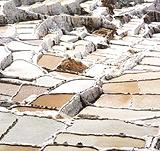 Sodium Chloride Salt is the most important of all seasonings. It is
essential to flavor and essential to life itself. It can also be
dangerous. Just how dangerous and how much of it is dangerous is very
much a matter of controversy today. For its importance as a seasoning
and for its effects on health we have given salt two pages of its own.
Photo © i0050.
Sodium Chloride Salt is the most important of all seasonings. It is
essential to flavor and essential to life itself. It can also be
dangerous. Just how dangerous and how much of it is dangerous is very
much a matter of controversy today. For its importance as a seasoning
and for its effects on health we have given salt two pages of its own.
Photo © i0050.
Salt - Varieties and Uses.
Salt & Health.
Other Simple Salts
Baking Soda
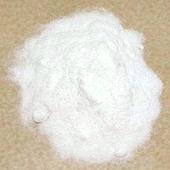 [Nahcolite (mineral form); Sodium bicarbonate, Bicarbonate of Soda,
Saleratus (19th Century)]
[Nahcolite (mineral form); Sodium bicarbonate, Bicarbonate of Soda,
Saleratus (19th Century)]
The main use of Baking Soda is as a leavening agent in quick breads and the like. It reacts with acids in the dough, producing bubbles of Carbon Dioxide. The acid may be provided by lemon juice, yogurt, buttermilk, cocoa, vinegar, cream of tartar or phosphates. Without acid, some Carbon Dioxide will be released by thermal decomposition at temperatures above 180°F/80°C.
Baking soda was formerly used to make green vegetables greener, but
this is little done today as the color looks artificial and it damages
nutrition and flavor. Today, color is preserved by not overcooking.
Baking soda is often used to speed cooking of beans and in the traditional
British dish Mushy Peas. In some regions it is used to tenderize meat,
but all these cooking uses degrade nutrition. More usefully, it is used
in breading of fried foods to make the breading more porous so it is
not steamed off the food. Baking Soda has been tested in place of
Edible Potash in various Nigerian recipes and found to work just fine.
Baking Powder
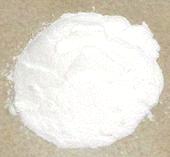
This mixture is used as a leavening agent for quick breads and baked
goods without enough gluten to hold bubbles long or where a fermented
taste is undesirable. It includes Sodium Bicarbonate (Baking Soda) and
an acid powder. Today most available is "Double Acting" with one acid
releasing at room temperature with moisture, the other releasing acid
with heat. The photo sample is made from Sodium Acid Pyrophosphate
(high temperature acid) Sodium Bicarbonate, Corn Starch (flow agent),
and Monocalcium Phosphate (low temperature acid). Baking Powders with
Sodium Aluminum Sulphate or Phosphate instead of Sodium Acid
Pyrophosphate are going out of style due to suspicion of Aluminum as
a neurotoxin and claims that some people can detect a metallic taste
in baked goods made with it.
Cream of Tartar
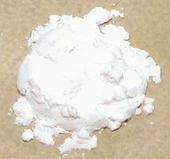 [Potassium bitartrate, potassium hydrogen tartrate]
[Potassium bitartrate, potassium hydrogen tartrate]
This substance is a byproduct of wine making.It is used to stabilize
beaten egg whites and whipped cream, and to reduce discoloration in
boiled vegetables. It is also used to prevent crystallization of sugar
syrups and sometimes as an acid ingredient in Baking Powders.
Lime
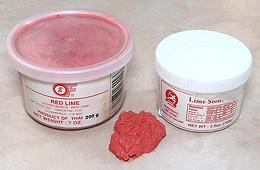 [Calcium Hydroxide, (Ca(OH)2)]
[Calcium Hydroxide, (Ca(OH)2)]
Lime is used in Thailand to produce crisper, longer lasting batters on
fruits and other deep fried items. It is also used in pickling, and has
long been so used in the West, but is no longer recommended.
Details and Cooking.
Potash, Edible
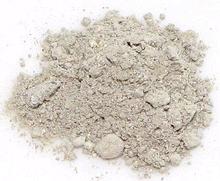 [Natron; Akanwu, Akaun (Igbo); Kanwa (Hausa); Hydrated Sodium Carbonate
(with other salts)]
[Natron; Akanwu, Akaun (Igbo); Kanwa (Hausa); Hydrated Sodium Carbonate
(with other salts)]
This substance is mineral salts gathered from dry salt beds in arid regions. Color will vary by region. It is used in cooking, particularly in Africa, to shorten the cooking time of beans, to emulsify Red Palm Oil with water, to make recipes with Okra more slimy (yes, they want that in Africa), and to make green vegetables more green.
Potash has been shown to reduce the amount of protein in foods it is
cooked with. Some of the other substances found in natural Potash may
be toxic, but used occasionally in recipe quantities it is considered
safe. It should not be consumed by pregnant women as it has been shown
to cause early stage abortions.
Subst: Baking Soda (not baking powder) has been tested
in various Nigerian recipes and found to work just fine.
Silica Gel Dessiccant
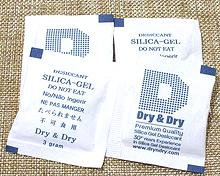 A porous form of glass that absorbs water, much used for food packaging to
keep crisp items crisp and avoid spoilage. For detais see our
Silica Gel Desiccant page.
A porous form of glass that absorbs water, much used for food packaging to
keep crisp items crisp and avoid spoilage. For detais see our
Silica Gel Desiccant page.
Food Additives
MSG
 [Monosodium Glutamate, Sodium Glutamate, Additive E621, Ajinomoto,
Vetsin, Accent]
[Monosodium Glutamate, Sodium Glutamate, Additive E621, Ajinomoto,
Vetsin, Accent]
This highly controversial white crystalline powder is rapidly increasing in use, particularly in processed foods. The reason for this is simple, it enhances flavors. Processed foods are loaded with salt and spiked with MSG to cover their lack of natural flavor.
First identified in seaweed, glutamate exists in many natural foods,
including mushrooms and some vegetables.
Formerly made from wheat, it is now industrially produced by bacterial
fermentation of carbohydrates, and is celiac safe. It's safety in other
respects has been strongly attacked and just as strongly defended. See
our page MSG & Health.
Diagram by Benrr101 contributed to the public domain.


